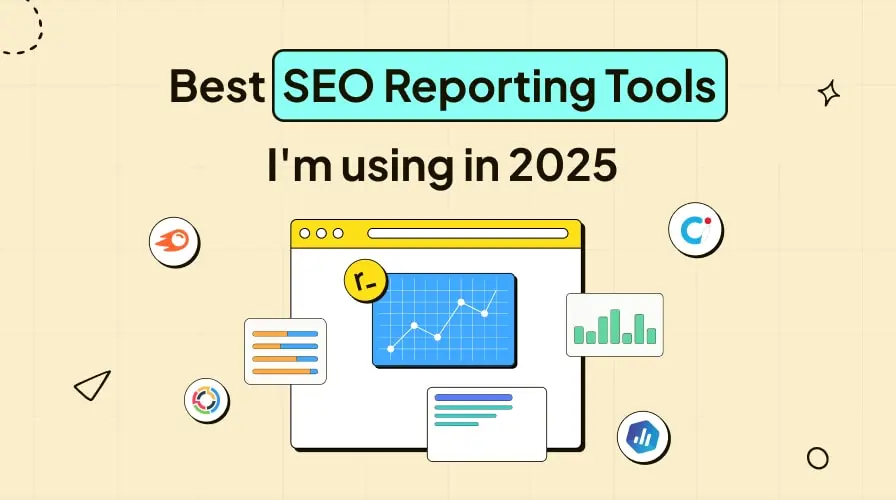

Reliable data pipeline and warehouse.

Prefetched data for faster loads.

Supports Looker Studio, BigQuery and more.

Legacy Reportdash Platform.

Data fetched on demand.

Export to Google Sheets or Looker Studio.

I've been doing SEO for last 5 years. Over the years, I’ve led SEO for dozens of software and tech companies, helping them scale their organic growth. During that time, I’ve used and tested many of the comprehensive SEO reporting tools and I’m constantly exploring the latest ones to drive better results for my clients.
We can all agree that reports are one of the most important parts of marketing. But with the rise of modern AI, spending hours every week creating SEO reports for all my clients feels like the most unproductive use of time.
In this post, I’m breaking down 10 SEO reporting tools for agencies and individuals based on my hands-on experience, so you can pick what’s best for your specific needs.
What Do I Consider the Best SEO Reporting Tools?
I generally recommend starting with the free tools that Google provides and that includes Looker Studio.
Other than that the tools listed below are more than enough to uncover the most important SEO insights and even help you rank #1 on Google (or any other search engine).

In fact, here are my top SEO reporting tools if you’d like to explore them:
ReportDash
SemRush
Click Insights
TapClicks
Databox
AgencyAnalytics
Coupler.io
RankMath
SE Ranking
In the end, I have also attached my SEO reporting template that I use to send my clients weekly and month SEO report.
What Makes a Great SEO Reporting Tool?
Based on conversations with other SEO experts and my own experience, the best tools have these features:
✅ Comprehensive integrations: Connect Google Analytics, Ahrefs, Semrush, SE Ranking — plug in and go.
✅ Customizable reports and dashboards: Every client has unique requirements. Set the right KPIs so both the client and I stay aligned.
✅ Automation capabilities: Schedule and send reports automatically — no more last-minute scrambles.
✅ Real-time data and AI-driven insights: Track SEO performance as it happens.
✅ User-friendly interface: Easy to read, analyze and act on. Complex data should always be simplified for your client or team.
With Looker Studio and a few other reporting tools, you can create reports in minutes and saving hours every week and giving you more time to focus on strategy and results.
10 Best SEO Reporting Tools
1. ReportDash - Marketing Reporting & Dashboard tool
Category: Looker Studio Reporting Templates
Best for: Marketers, freelancer and agencies using tools like GA4, Google search console, Google Ads
Ease of use: Beginner to intermediate
Pricing: Free plan of 14 days, Starts at $19 per month
Founded just less than 2 years ago, ReportDash has quickly become my favorite reporting tool for creating and automating easy reports on Looker Studio with marketing templates.
How ReportDash Works
ReportDash is a tool that helps you create marketing reporting on Looker Studio. You can also build fully customized reporting templates and automate the entire process from fetching data to sending reports to clients.
What makes this tool stand out is its deep market researched templates. ReportDash has analyzed different marketing use cases and created ready-to-use templates for Meta Ads, SEO, Google Ads, Analytics Insights and more — all in one place. You simply connect your data sources based on the report you want and the platform handles the rest.
Additionally, their new Data Warehouse feature takes care of the heavy lifting from data fetching and storage to periodic updates, so you can focus on insights instead of loading screens. You can even export your DataStore data to BigQuery, Google Sheets, or access it directly via API.
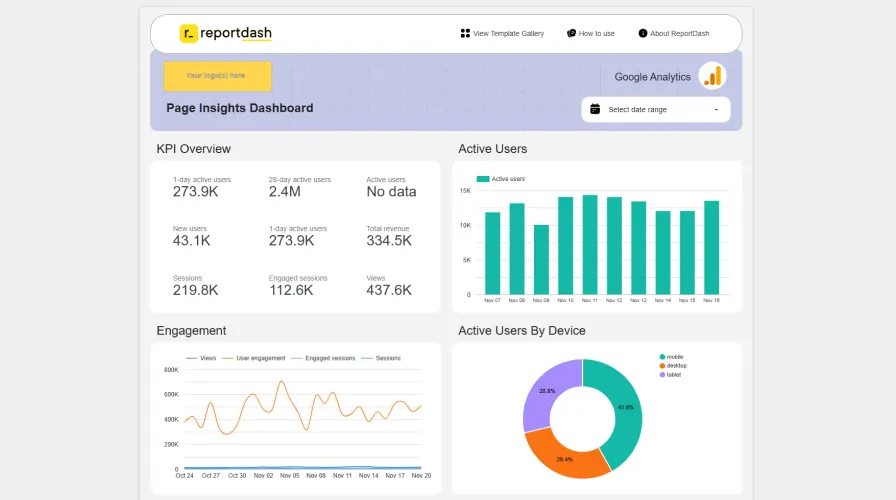
Who is ReportDash for?
As someone who's led SEO marketing, started a Marketing agency and runs a media company, I think ReportDash can actually be used for anybody who's goal is to analyze complex marketing data from different marketing channels and build strategies for businesses.
Pricing Plans
ReportDash has four pricing tiers and you get a 15% discount and get 2 months free if you pay annually, but I'm going to just list out the monthly prices below because that's generally what most people, like me, care about first.

Here are ReportDash plans:
Solo: This runs you $19 per month and gives you access to add 2 data sources and pretty much everything you need to generate reports and share branded email reports with unlimited reports and dashboards.
Professional: This runs you $79 per month and gives you access to add 15 data source and pretty much everything you need to generate reports and share branded email reports with unlimited reports and dashboards.
Agency: This runs you $149 per month and gives you access to add 30 data source and pretty much everything you need to generate reports and share branded email reports with unlimited reports and dashboards.
Enterprise: This runs you $249 per month and gives you access to add 50 data source and pretty much everything you need to generate reports and share branded email reports with unlimited reports and dashboards. Also, get a Personalized Support 24/7.
Pros
The reporting tools are amazing. If you're looking to better analyze and optimize your strategies based SEO data it's amazing.
It has 50+ data source compatibility.
No code setup: You can automate the whole reporting process easily.
Cons
You need to have some sort of basic understanding of Looker studio(Google data studio)
New SEO tools can be integrated for more advanced data and reports.
As you can see, this is still a very underrated tool, but it's growing really fast and it's actually used by many small teams and freelancers.
2. SemRush - All in One SEO tool

Category: SEO & digital marketing toolkit
Best for: Marketers, agencies, freelancers and in-house teams looking for keyword research, backlink analysis, content optimization, competitor insights
Ease of use: Intermediate to advanced (lots of features, some learning required)
Pricing: Free limited version; paid plans start around $139.95/month for the SEO Toolkit.
How SEMrush Works
SEMrush is a broad digital-marketing and SEO tool that helps you with everything from keyword research and site audits, to tracking competitors, analyzing backlinks and monitoring content performance. You can also plug into specific toolkits (SEO, Content, Advertising, Social, Traffic & Market) based on your needs.
It stands out because it provides deep data across many channels, enabling you to analyze entire marketing ecosystems (organic search, paid search, content, social) from one interface. For example, its SEO Toolkit gives you keyword tracking, site audits, competitive positioning and more.
SEMrush One new AI Optimization / AI Search Monitoring capability allows brands to track how they’re being cited and shown across AI-powered search platforms (like ChatGPT, Claude, Gemini and Perplexity) and benchmark their share of voice in these generative-AI results.
With this feature, marketers can analyze which prompts or queries their brand appears in, inspect how AI systems are sourcing their content as links and take proactive steps to optimize for visibility in the upcoming “AI-search” economy rather than just traditional SERPs.
Who is SEMrush for?
I personally use SEMrush for many different purposes however you can particularly use it for:
analyzing multiple clients’ SEO performance, across geos (like US/UK)
building content & SEO strategies to feed top-of-funnel traffic (which aligns with your ReportDash/Altorise objectives)
needing robust competitor, backlink and keyword data as part of your services.
If your use case is mainly reporting dashboards rather than deep SEO tooling, you may find SEMrush’s breadth more than you need, or you may need to pick carefully which components/toolkits you rely on.
Pricing plans (monthly view)
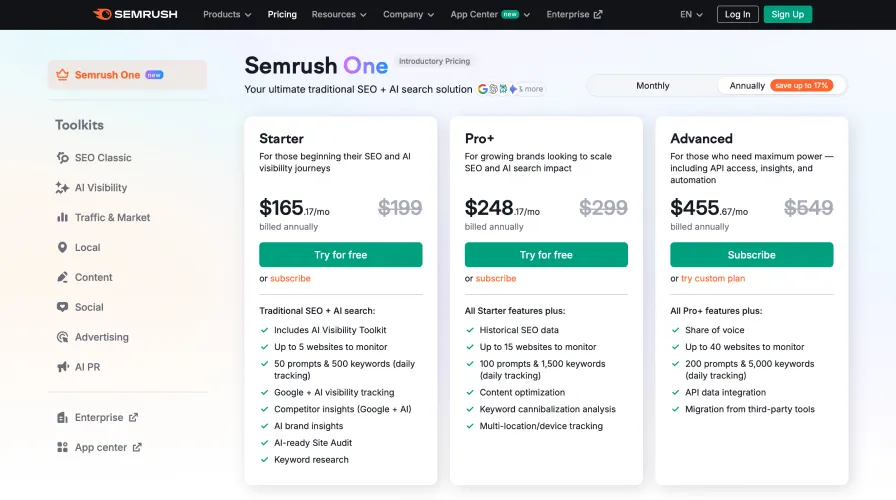
Starter (SEO Toolkit entry): ~$165.917/month, track ~500 keywords, audit ~100k pages.
Pro+ (mid-tier): ~$248.17/month, more keywords, historical data, content marketing tools.
Advanced (top tier for agencies): ~$455.67/month, API access, extended limits, many projects.
Other toolkits can be added (Advertising, Social, Traffic & Market, etc.) at additional cost.
Pros
Very comprehensive platform: keyword research, backlinks, content optimization, competitor analysis all in one place.
Rich data sets and insights, suitable for agencies and multi-client environments.
Flexibility via toolkits to pick what you need; not locked into a single narrow function.
Good for growing your SEO & content strategy, especially if you’re servicing clients across geographies or sectors.
Cons
Cost – It can be expensive, especially at the higher tiers; this may matter if your usage (or ROI) is not high.
Complexity/learning curve – With so many features it can be overwhelming, especially for beginners.
Overkill for simple dashboarding/reporting use-cases – If your primary need is automated reporting dashboards (like your ReportDash focus), you might only use a fraction of SEMrush’s power.
Licence/limits and add-ons: Additional users, extra data limits and add-on toolkits push the price further.
3. Click Insights – SEO Reporting Dashboard & Rank-Tracking Tool

Category: SEO monitoring, auditing & reporting suite
Best for: Agencies, SEO professionals and freelancers managing multiple clients, who need rank tracking, audit tools and white-label reports
Ease of use: Beginner-to-intermediate (straight-forward dashboards but some SEO knowledge helpful)
Pricing: Free 14-day trial; plans start from £10 / ~$12 per month for basic tracking.
How Click Insights Works
Click Insights is built by agency Click Intelligence (UK) and offers a suite of tools for SEO monitoring: daily keyword rank tracking (including AI/LLM-search referral visibility), full integration with Google Analytics 4 & Google Search Console, content audit, backlink audit and white-label reporting dashboards.
What makes Click Insights stand out is its strong agency-focus: you can brand dashboards fully, manage multiple client projects under one interface and scale keyword/backlink tracking as you grow.
Who is Click Insights for?
Given your agency and reporting ambitions:
If you manage multiple clients (SMBs, agencies, enterprise) and need to deliver white-label SEO reports, this tool aligns well.
If you're building dashboards, templates and want automation in auditing + ranking + client-reporting workflows, it’s a good fit.
If your focus is primarily marketing campaign data (ads, social, full-funnel) rather than deep SEO only, you might find it more specialised in SEO than full multi-channel marketing reporting.
Pricing Plans (monthly view)
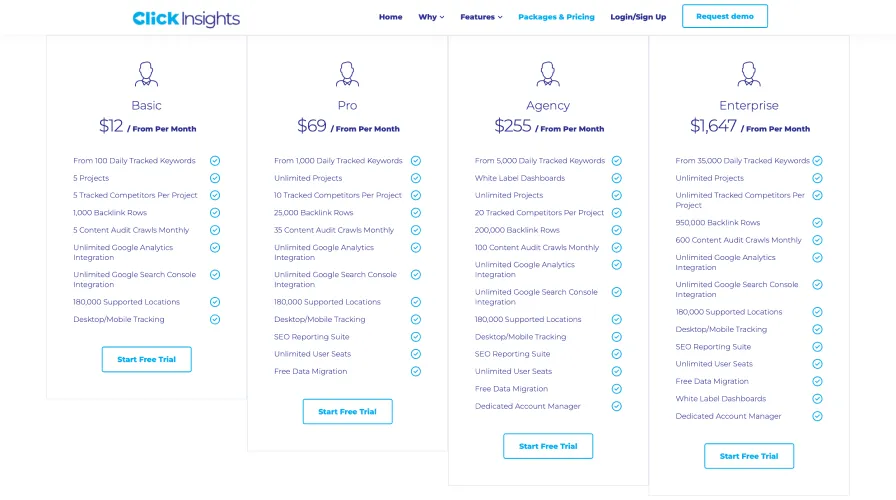
Here are notable tiers:
Basic / From £10 (~$12): Track ~100 daily keywords, up to 5 projects, integrations with GA4/GSC.
Pro / From ~£52 (~$69): ~1,000 daily keywords, unlimited projects, more backlink rows, content audit crawls, white-label.
Agency / From ~£190+: Larger scale for unlimited projects, thousands of keywords/backlink rows, full white-label dashboards, dedicated account manager.
Pros
Strong keyword rank tracking including global locations (over 180,000 IP locations) and daily updates.
Full white-label reporting & agency-friendly setup: brandable dashboards, client access, multi-project management.
Includes content auditing (technical SEO, crawl issues, page structure) and backlink analytics in one platform.
Adds forward-looking features for AI/LLM search referrals and “AI Overviews” tracking.
Cons
While excellent for SEO, it may lack full multi-channel marketing reporting features (ads, social, email) in comparison with full reporting-/dashboard tools — if your focus is all channels, you might need to supplement.
Some learning curve if you want to utilise full auditing/backlink features (you’ll need SEO know-how to interpret & act on the data).
Pricing scales steeply when you move into high keyword counts, unlimited projects etc., which may increase cost for large enterprise-level needs.
If your primary need is purely dashboard visualisation and template-driven reporting (rather than deep SEO insight), it may be more feature-rich than necessary (and some features may go unused).
4. TapClicks – Unified Marketing Operations & Reporting Platform
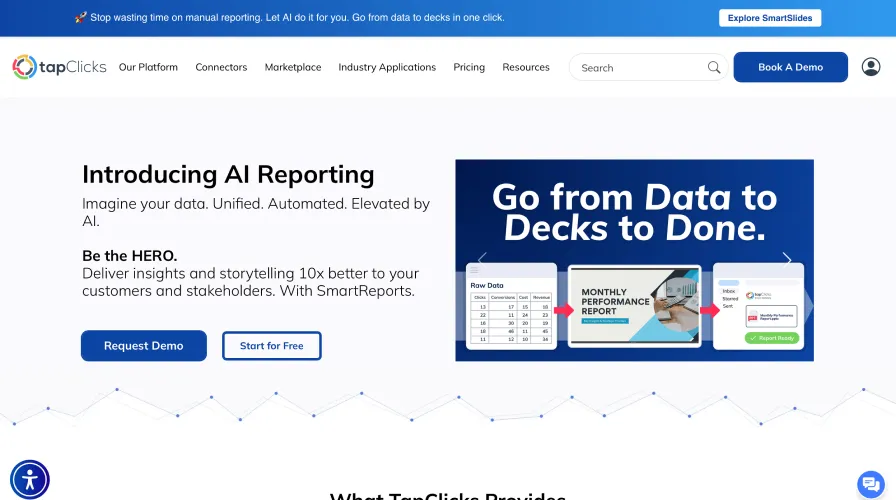
Category: Marketing operations, analytics & automated reporting suite
Best for: Agencies, media companies and brands managing multiple clients, campaigns and data sources
Ease of use: Intermediate to advanced (powerful features require setup and training)
Pricing: Demo / trial available; public feedback indicates pricing begins around $500/month for full-feature agency tiers.
How TapClicks Works
TapClicks helps you unify marketing data across channels, automate reporting, manage workflows and deliver branded client dashboards for agencies and large marketers.
You connect your ad networks, analytics, CRM, offline data and more (250+ instant connectors + custom sources) and then use modules like TapAnalytics for insights, TapReports for client-ready visuals, TapWorkflow/TapOrders for campaign order + execution workflows.
What makes it stand out: advanced data blending, scalability (many clients & campaigns), deep automation of report delivery and strong focus on agency operations (client access, business units, white labelling).
Who is TapClicks for?
Given your role as a marketing-reporting SaaS & agency founder:
If your agency handles a large volume of campaigns and clients and you want a robust platform to streamline data + reporting + operations across them, TapClicks fits well.
If you’re building branded dashboards, templates, automating report delivery and want to integrate many data sources including offline or custom ones, this is a strong option.
However, if your primary need is lightweight dashboarding / simple reporting templates (e.g., smaller client sets, fewer data sources), the complexity and cost of TapClicks may be more than needed.
Pricing Plans (Monthly View)

Not publicly fully transparent, but user reports suggest starting around $500/month for full agency features.
Custom pricing likely for enterprise (many clients, custom integrations) and additional modules (e.g., AI insights) add cost.
A trial/demo is available for evaluation.
Pros
Excellent multi-channel data aggregation: supports 250+ instant connectors and the ability to bring in offline/custom sources.
Strong agency-oriented features: business unit/client management, white-label reports, automated dashboards, scale across clients.
Automation & scalability: once set up, you can replicate templates, automate delivery and reduce manual labour across campaigns and clients.
Cons
Steep learning curve & setup effort: Many users report that initial configuration, widget creation and data blending require significant time/skill.
Cost: The pricing can be high especially for smaller agencies or when scaling many clients/campaigns.
Occasionally issues with data accuracy / connection stability: Some user feedback notes data lags, connection breaks or manual interventions needed.
5. Databox – Unified Analytics & Automated Reporting Platform
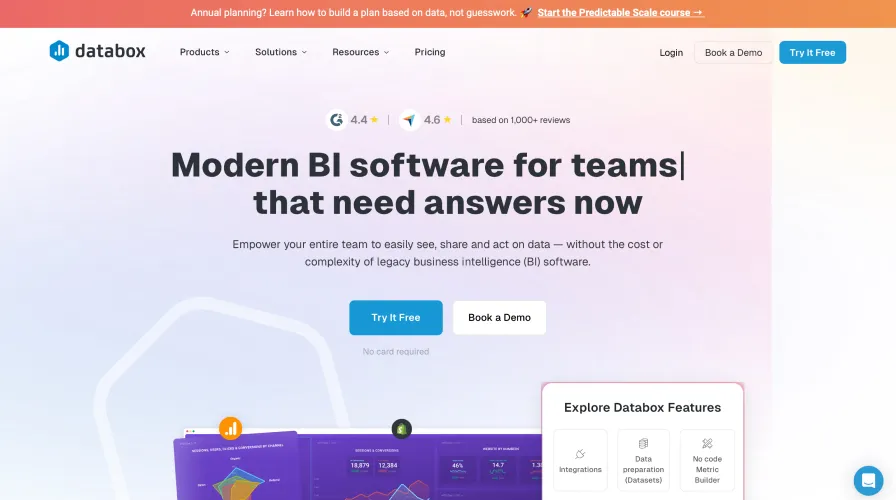
Category: Reporting dashboards & BI (business intelligence)
Best for: Agencies, marketing teams, analytics-led companies needing multi-source dashboards and automated client reports
Ease of use: Beginner to intermediate (no-code interface, but plenty of features to explore)
Pricing: Free 14-day trial; paid plans begin at ~$159/month for basic plan.
How Databox Works
Databox helps you bring together data from many sources (130+ cloud tools, spreadsheets, APIs) into one dashboard, build custom metrics, set goals, automate alerts and push reports out on schedule.
What makes it stand out is that it supports unlimited users on paid plans (so your whole team or all your clients can access) and it emphasises automated reporting workflows — build once, schedule delivery (via email/Slack) and share branded dashboards or reports without re‐doing manual work each month.
Who is Databox for?
Given your role (running a marketing-reporting SaaS, agency, multi-client dashboards) this tool is a very strong fit if you:
Need to deliver consistent client reports across multiple clients/projects and want to automate much of the heavy lifting
Want a dashboard/reporting tool that supports metrics from many marketing channels and data sources (ad networks, analytics, SEO, CRM)
Want to scale your operation (templates + repetition) and support multiple users/clients under one platform
On the flipside: if your focus is purely building highly bespoke visualisations in one data source (e.g., only Google Ads + GA4) then the broader BI features may go under-used, or cost might escalate depending on number of data sources.
Pricing Plans (Monthly View)

Here are representative tiers:
Professional: ~$199/month — includes 3 data sources, unlimited users, unlimited dashboards & custom metrics.
Growth: ~$499/month — everything in Professional + AI-powered analytics (performance summaries, forecasts), more advanced data handling.
Premium / Enterprise: ~$999/month (or custom) — includes high number of data sources (100+), advanced sync frequency, advanced security, dedicated support.
Add-ons: Additional data sources beyond the included number cost ~$5.60 per source per month.
Pros
Multi‐source aggregation: Connects 130+ cloud sources, spreadsheets, API/SDK, making it flexible for many marketing data types.
Unlimited users & dashboards on paid plans: Good for agencies servicing many clients (you don’t pay per user).
Automation of reporting: Build a dashboard/report once and schedule it to send via email/Slack; supports embedding and mobile delivery.
Strong agency/client support: White labelling options, templates reusable across client accounts, client-account management.
Cons
Cost scales with number of data sources: If you have many clients each with multiple data sources, the additional data source fees can add up.
Some users report interface quirks / learning curve: While described as no-code, pulling deeply custom metrics or blending datasets takes time.
Data refresh frequency & connector stability: For some sources the sync frequency or completeness of data may be less than ideal or require manual intervention.
Overlap with other tools: If your core need is simply producing static monthly reports in Looker Studio with simple templates, Databox might provide more features (and cost) than required.
6. AgencyAnalytics – Client-Reporting & Dashboard Platform for Agencies
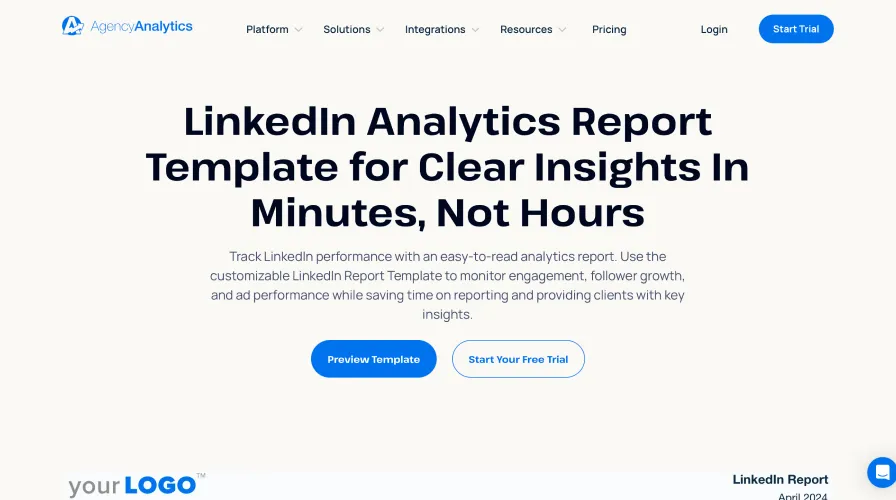
Category: Reporting dashboards & marketing-agency operations suite
Best for: Agencies, freelancers and consultancy-firms managing multiple clients and needing automated white-label reports across SEO, PPC, social and more
Ease of use: Beginner to intermediate (designed for agency workflows though some set-up and template-management needed)
Pricing: Free trial available; plans begin around US$59/month for small clients (annual billing) and scale with client count.
How AgencyAnalytics Works
AgencyAnalytics helps you pull data from dozens of marketing channels (80+ integrations) into one branded dashboard or client portal.
You can customise dashboards with drag-and-drop widgets, schedule automated reports to clients, white-label everything (your logo, colors, domain) and manage multiple client campaigns from one account.
What makes it stand out is its agency-first design: you can onboard new clients quickly with templates, manage client access, send auto-scheduled reports and present data professionally with minimal manual overhead.
Who is AgencyAnalytics for?
Given your role (running a marketing-reporting SaaS, an agency and serving marketers across geos), AgencyAnalytics is well-suited if you:
Manage multiple clients and need a systemised way to create, deliver and brand reports.
Pull in data from many sources (ads, analytics, SEO, social) and want a central dashboard you can hand to clients.
Want white-label reporting with minimal development so your brand stays front and centre.
On the flip-side: if your focus is extremely custom visualisation, heavy data modelling or you rely on deeply layered analytics workflows, you may find there are limitations (see “Cons” below).
Pricing Plans (Monthly View)
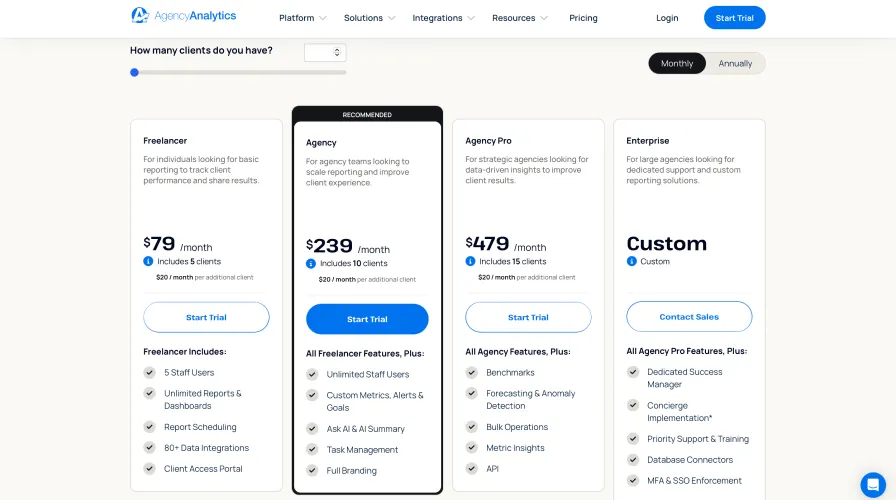
Here are representative tiers (approximate and based on annual billing):
Freelancer / Launch: ~$79 / month — includes ability to report on ~5 client campaigns.
Agency / Grow: ~$239 / month — includes more client campaigns (~10 clients), more features (branding, automation)
Agency Pro / Perform: ~$479 / month — includes more client campaigns (~15), advanced features (AI insights, anomalies, data aggregation)
Extra clients, extra premium features (MySQL/BigQuery connectors, custom integrations) typically cost more.
Pros
Very strong for agency-centric workflows: client management, campaign dashboards, white-labelling, scheduled reporting automate a lot of manual effort.
Makes it easier to present professional-looking reports to clients with branding, simple dashboards and consistent metrics.
Good integration coverage (80+ sources) so you can pull in many standard marketing channels from one place.
Cons
Users report limitations in bulk editing of dashboards/templates and limited data blending capabilities.
Some users experience delayed data refreshes, broken connections, or integrations that require manual checking.
Pricing increases can be steep when managing many clients or needing advanced integrations; some add-ons (e.g., MySQL/BigQuery) are very costly.
While it’s strong for reporting, it may not be as deep in advanced analytics, competitor intelligence or custom modelling compared with dedicated SEO/BI tools.
7. Coupler.io – Reporting Automation Platform

Category: Data-integration/ETL & automated reporting platform
Best for: Agencies, marketers and analytics teams needing to pull together multiple sources (ads, CRM, finance, analytics) into spreadsheets/BI quickly
Ease of use: Beginner to intermediate (designed for non-technical users with no‐code UI, though some setup/logic still needed)
Pricing: Free plan with basic usage available; paid plans scale based on number of data connections.
How Coupler.io Works
Coupler.io allows you to connect your apps (over 700 integrations) to destinations like Google Sheets, Excel, BigQuery, Looker Studio, etc., then transform, blend and schedule data exports so that your dashboards stay up-to-date.
What stands out is its “set-it-and-forget-it” model: once you map your data flows, schedule them (even down to every 15 minutes), blend/clean data and then connect to your reporting layer — so your clients or internal team always see fresh insights.
Who is Coupler.io for?
Given your context (you run a marketing-reporting SaaS, an agency, multi-client dashboards) this tool is a strong fit if you:
Need to automate the aggregation of many data sources (ad networks, analytics, CRM, finance) into a unified report/dashboard environment.
Want to reduce manual data-prep time (exporting, cleaning, merging) and focus instead on insights and optimization.
Want a tool that fits agency workflows with many clients, custom templates, scheduling and automation.
On the flip side: if your primary need is simply “use a few pre-built dashboards and lightly do reporting,” or if you’re heavily into visualization/design rather than data piping, then Coupler.io might feel more like the plumbing than the polished front-end.
Pricing Plans (Monthly View)
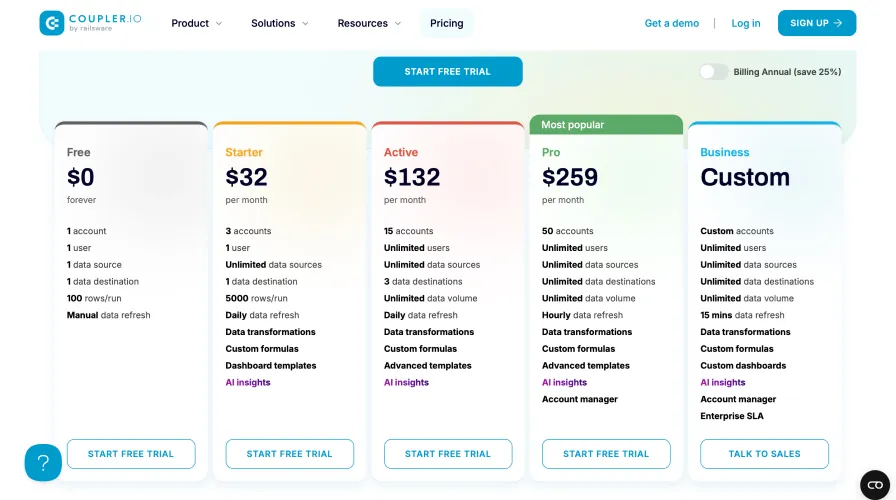
Here are representative details:
Free plan: 1 data connection, no automated refresh (or limited) and row limits.
Paid tiers: Pricing increases as you add data connections (each connection defined by importer × source account) and refresh frequency.
Custom enterprise / services: They offer guided onboarding, analytics service bundles (e.g., $499/month for Pro + data-analyst hours) and custom integrations.
Pros
Very strong in data integration & automation: connects many apps, supports scheduling, blending and no-code transformations.
Makes you more efficient: Agencies have reported major time savings in onboarding and reporting when using Coupler.io.
Designed for non-tech users: The interface and process enable marketers/analysts (not just engineers) to set up data flows.
Flexibility in destination: Google Sheets, Excel, BI tools, warehouses -> useful for agencies that build dashboards (including your target use with Looker Studio etc).
Cons
Cost can add up with many data connections: One reviewer said:
“It can really get pricey when adding multiple data connections, for example a YouTube channel needs 6 data connections each…”
Some users report limitations in data sources/integrations or quirks: e.g., “There are still a few key platforms… that don’t integrate yet.”
It is more “data plumbing” than fully-fledged polished dashboard/report designer: If your need is heavy in visualization and design of client-facing dashboards (rather than data collection & flow) then you may need to pair with a strong dashboard tool.
Setup/maintenance still requires effort: While no code, you may still need to map flows, blend data, manage refresh schedules and resolve API/connection issues over time.
8. Rank Math – All-in-One SEO Plugin for WordPress

Category: On-page SEO & WordPress optimization plugin
Best for: Website owners, content marketers, bloggers, e-commerce stores and agencies using WordPress who need an integrated SEO solution
Ease of use: Beginner to intermediate (offers a setup wizard plus many configurable modules)
Pricing: Freemium model — free version with many core features, Premium version upgrades available.
How Rank Math Works
Rank Math is a WordPress plugin that helps you optimize content, manage technical SEO (sitemaps, schema markup, redirections), integrate Google Search Console & Analytics metrics into WordPress and track keyword rankings—all from within your WP dashboard.
What makes it stand out is the breadth of features available even in the free version (e.g., structured data, multiple keywords per page, analytics integration) plus the modular design (you enable only the features you need) which keeps your site performance in mind.
Who is Rank Math for?
Given your context (you manage a marketing-reporting SaaS and agency, target content and SEO for clients):
If you’re building or managing WordPress sites for your agency clients and want a single plugin to cover on-page SEO, structured data, keyword tracking and analytics integration, Rank Math is a solid choice.
It’s particularly useful if you publish frequent content (blogs, templates, resources), manage multiple sites, or want to streamline SEO workflows for clients.
On the flip side, if your focus is purely from the client-reporting dashboard side (rather than building/editing websites) or you use non-WordPress platforms, then a WordPress-specific plugin like Rank Math may not be directly applicable.
Pricing Plans (Monthly View)

Here are some illustrative details (actual pricing may vary by region/licensing):
Free Tier: Includes many core SEO features (optimization, schema, sitemaps, analytics integration) available at no cost.
Premium / Pro Tier: Unlocks advanced modules (e.g., advanced schema types, advanced analytics, multiple site licence) — users report pricing that is higher for larger sites or network usage.
Pros
Very feature-rich for the price — especially the free version offers more than many competitors in terms of SEO tools.
Modular design allows you to turn on/off features so you don’t load unused modules, helping performance.
Good integration with Google Search Console, Analytics, multiple schema types (making structured data setup easier) which is useful for content-and-SEO heavy workflows.
Cons
Some users report that advanced modules (e.g., Content AI module) are overpriced or not as mature as expected.
Because it aggregates many features, enabling many modules (analytics, rank tracking) can impact site performance or increase server load in some cases.
While it claims seamless migration from other SEO plugins, plugin-switching still carries risk (meta/sitemap issues etc) so for large/multi-site clients you need to plan carefully.
9. SE Ranking – All-in-One SEO Platform with Agency-Focus
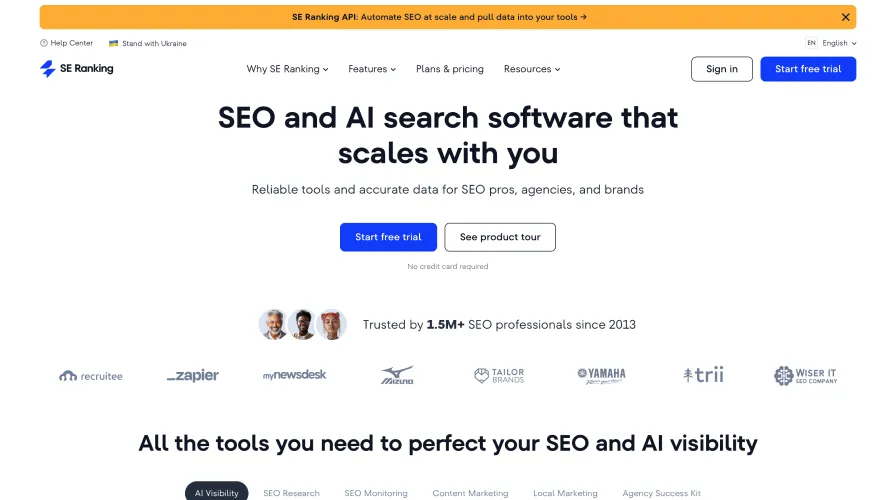
Category: SEO & digital marketing software
Best for: SEO professionals, in-house teams and agencies that need site audits, rank tracking, content workflow and white-label reporting
Ease of use: Beginner to intermediate (intuitive interface, but advanced features take some exploration)
Pricing: Free trial available; paid plans start from around £ 44/month (for the “Essential” tier) for basic SEO monitoring.
How SE Ranking Works
SE Ranking gives you a full suite of SEO tools: keyword research, rank tracking (desktop/mobile, location-specific), website audit, backlink monitoring, content optimization features and agency tools (white-label reports, client seats).
What makes it stand out is the strong value (feature-rich at a lower cost than many competitors) and the agency-oriented toolset (e.g., white-label dashboards, client management, automated reports) that fits multi-client workflows well.
Who is SE Ranking for?
Given your role (running a marketing-reporting SaaS/agency, doing multi-client dashboards, publishing content, SEO campaigns) this tool is a very relevant pick if you:
Manage many client SEO campaigns and need a platform that handles audits, rankings, backlinks and content optimization in one place.
Want to scale your reporting templates and deliver branded dashboards/reports to clients (white-label & automation).
Want a more cost-effective tool than some premium competitors when your focus is SEO and content (rather than full MarTech stack).
On the flip side: if you’re very heavy into multi-channel marketing data (ads, social, marketing ops) and need extremely advanced BI/data-warehouse features, you might find SE Ranking a bit narrower in scope.
Pricing Plans (Monthly View)
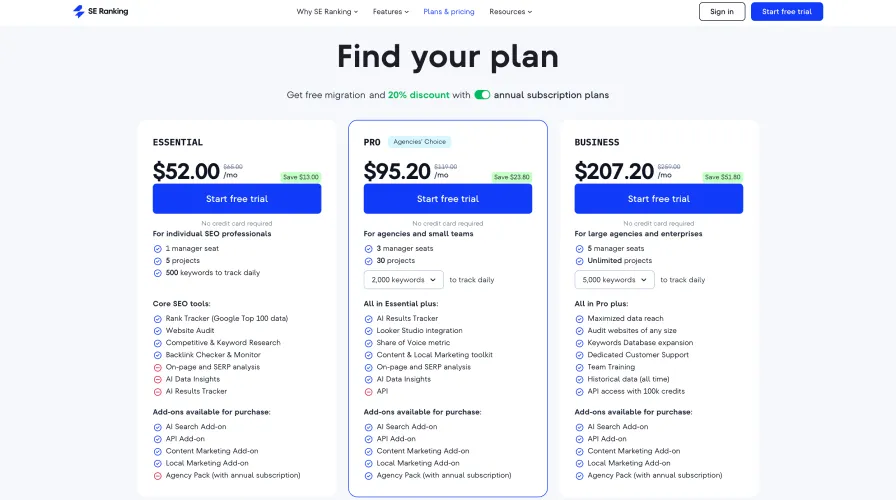
Here are representative tiers:
Essential: From ~£ 44/month (~US$55) for basic SEO monitoring.
Pro: From ~£ 76/month (~US$95) for agency-level features including more keywords/projects and “AI Search Toolkit”.
Business: From ~£ 167.20/month (~US$209) for large agencies/enterprises with unlimited projects, API access, white-labeling.
Add-ons (e.g., Content Marketing module, Local Marketing, Agency Pack) are available for extra cost.
Pros
Excellent value: Many strong SEO features (rank tracking, audit, content tools) for less cost than many high-end alternatives.
Agency-friendly: White-label reports, client seats, automated dashboards — good fit for multi-client agencies.
Broad SEO coverage: Keyword research, competitor analysis, backlink monitoring, content optimization, local SEO tools all in one place.
Cons
Depth: Some users feel the keyword research data or backlink database is not yet as deep/mature as some top-tier tools.
Multi-channel/advertising support: If your focus includes heavy PPC, social analytics, ad performance, you may find the tool less strong in those areas.
Setup & feature learning: While the interface is user-friendly, extracting full value (especially for larger clients/multiple projects) still requires time and process.
Pricing/limits: For very high keyword-volumes, many projects, or enterprise needs, costs and management may scale up.
Conclusion
Choosing the right SEO reporting tool can significantly improve the efficiency and effectiveness of SEO processes for you and your clients.
From tracking keyword rankings to backlinks, each tool on this list has been selected for its unique capabilities and proven track record in helping individual and agencies like yours demonstrate value to clients.
As you plan the SEO strategy for new clients, the right SEO reporting solution can make a lot of difference.
ReportDash is both intuitive to use on the agency side and easy to understand on the side of clients reading the SEO reports.
In addition to multiple time-saving and scalable features built primarily for agencies, ReportDash is an SEO reporting platform that covers the entire data journey, from connecting diverse SEO tools to organizing their data to creating beautiful SEO reports.
Sign up for a free trial today and save time connecting and sharing SEO insights to your clients!
